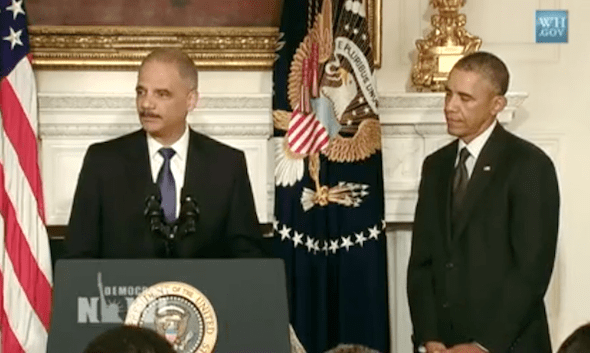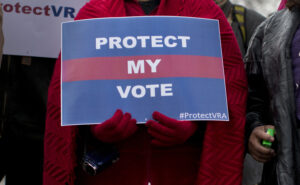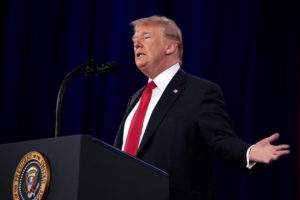Debate: One of the Finest Attorneys General in the Nation’s History?
Assessments of Attorney General Eric Holder’s legacy have been mixed. The NAACP Legal Defense Fund hailed him for his role in transforming the Civil Rights Division of the Justice Department and his leadership on voting rights. Meanwhile, the American Civil Liberties Union criticized Holder’s record on national security issues.
Assessments of Attorney General Eric Holder’s legacy have been mixed. The NAACP Legal Defense Fund hailed him as one of the finest attorneys general in the nation’s history in part for his role in transforming the Civil Rights Division of the Justice Department and his leadership on voting rights. Meanwhile, the American Civil Liberties Union criticized Holder’s record on national security issues.
The ACLU notes that during Holder’s time in office, the Justice Department approved the drone killing of an American in Yemen, approved the National Security Agency’s mass surveillance programs, failed to prosecute any Bush administration officials for torture, and presided over more leak prosecutions than all previous Justice Departments combined.
“Democracy Now!” speaks to Georgetown University professor Michael Eric Dyson, Robert Weissman of Public Citizen, Leslie Proll of the NAACP Legal Defense Fund and Baher Azmy of the Center for Constitutional Rights.
Azmy’s comment on Holder’s record, especially “the intersection of national security and civil rights,” was:
Well, regarding the intersection of national security and civil rights, I think he’s had a very troubling legacy, most fundamentally by extending and solidifying the sort of wartime architecture and narrative into our legal system. And so, in some ways, he’s been an extension of the Bush administration’s Justice Department around indefinite detention at Guantánamo, the warrantless surveillance of U.S. citizens, and in some areas has even gone farther, around the targeting of journalists who seek to expose illegal federal government misconduct and the use of targeted killing practices to execute U.S. citizens without due process.
… Certainly there was an alternative. The alternative, I think, had been articulated fundamentally by President Obama—or candidate Obama, and in rolling back some of the excesses and rejecting the false choice between national security and civil rights. But that alternative wasn’t pursued. In fact, we sort of doubled down. And the danger, of course, is now that the sort of Bush administration practices around national security are not exceptional anymore, they have been solidified. There has been seepage and strengthening of the ties between wartime and law. And that’s going to take a long time to undo.
‘Democracy Now!’:
— Adapted from “Democracy Now!” by Alexander Reed Kelly Your support matters…Independent journalism is under threat and overshadowed by heavily funded mainstream media.
You can help level the playing field. Become a member.
Your tax-deductible contribution keeps us digging beneath the headlines to give you thought-provoking, investigative reporting and analysis that unearths what's really happening- without compromise.
Give today to support our courageous, independent journalists.






You need to be a supporter to comment.
There are currently no responses to this article.
Be the first to respond.